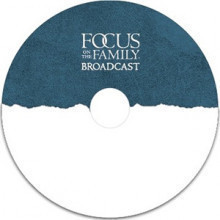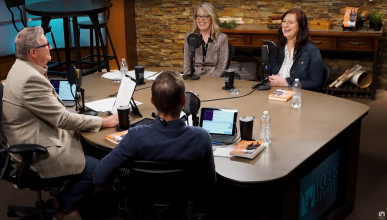
Improve Yourself, Improve Your Relationships
Drs. Les and Leslie Parrott explain how you can improve your marriage by becoming emotionally healthy, and examine three key aspects of good emotional health.
Today, an expectant mother faces a life-and-death decision. Will you help save her baby’s life? Double your gift to help save babies from abortion through a $1.1 Million Match Opportunity!
Rescue 2x the babies from abortion!
Home » Episodes » Focus on the Family Broadcast » Thriving as a Wife and Mom in the Middle Years (Part 2 of 2)
John Fuller: Today on Focus on the Family, we’re turning back to a conversation that we started last time, it’s about the middle years and how you can use that season of transition to assess what’s important, what’s not, and ways to change your life for the better. Your host is Focus president and author, Jim Daly, I’m John Fuller. And Jim, uh, a few quotes about age, perhaps, uh, that illustrate (laughs) some of the challenges and humor that people have shared, uh, about this time of life. For example, comedian Bob Hope said, “Middle age is when your age starts to show around your middle.” (laughs)
Jim Daly: That’s a perfect example, I guess. I think there’s another one, author Ogden Nash believes middle age is when you are sitting at home on a Saturday night and the telephone rings, and you hope it isn’t for you. (laughs) How about that one? I’ve been there for a few years. (laughs)
John: Absolutely, yes. Leave me alone.
Jim: A phone call, yeah.
John: Yeah. Journalist Earl Wilson observed that, “Middle age is later than you think and sooner than you expect.”
Jim: Well, that’s so true. And John, we had a great conversation last time at Lisa-Jo Baker and my wife, Jean, which was always good to have her here in the studio.
John: Mm-hmm.
Jim: And we talked about the challenges in the middle years, in the area of, uh, self-identity, and who are we, and what do we look like, (laughs) and, and then into our marriages and our parenting challenges.
John: Mm-hmm.
Jim: If you miss that, uh, go back and listen it ’cause I thought it was really good…
John: It was.
Jim: … Had some great content. We’re gonna continue that discussion today.
John: Yeah. And the basis for the conversation is a book that Lisa-Jo has written called The Middle Matters: Why That (Extra)Ordinary Life Looks Really Good on You. And we have copies of that here, stop by focusonthefamily.com/broadcast, or call 1-800, the letter A, and the word FAMILY.
Jim: Lisa-Jo and Jean, welcome back.
LIsa-Jo Baker: It’s so fun to be here. (laughs)
Jean Daly: It’s great to be back.
Jim: It’s good to have you back. And Lisa-Jo, that’s probably a good place to start. Why would you do this? Why would you write all this (laughs) in a book about your, really some of your failings? I mean it’s helpful to young moms that’s for sure.
Lisa-Jo: Right, I guess I have a two-part answer. One is, when I had really little kids, I wrote a book called Surprised by Motherhood, I was here and talked about it here on the show with you. And The Middle Matters is really the sequel in many ways, because I realized I had come out of the sleep deprived toddler making bottles all night long phase and had entered middle school, high school, and looking toward college. And it occurred to me, oh, oh, I’m in the middle, (laughs) like in every possible way. And I was so surprised to discover how much I was enjoying it. And so in many ways, what I wrote here is a collection of what I like to think of as love letters to ordinary life. These are essays that celebrate completely mundane things. So your kid doing well in a spelling test, kids that you take to sports practices, you know, the fights you have in your marriage, and you work through, that’s the stuff that makes a whole life. Movies often take part in those opening credits, but there’s the whole rest of the 40 years you live together, the middle, and I wanted somebody to write love stories about that.
Jim: You know, talking about that idea of the formula of Hollywood…
Lisa-Jo: Right.
Jim: … The one thing that God, I think has put in our hearts is this idea about heroes.
Lisa-Jo: Right.
Jim: How do we find heroes? I mean, Jesus is the ultimate hero, right?
Lisa-Jo: Right.
Jim: He saved us through his death.
Lisa-Jo: Mm-hmm.
Jim: How do we encourage our kids, uh, to look for the heroes around them?
Lisa-Jo: This is something I’ve especially noticed as my kids are coming into their adulthood now, this longing for heroes, whether it’s a sports hero, or a movie star, or a singer, or a YouTube personality, there’s this hunger, right, to admire something or someone. And so, uh, first I’ll say this, I think as parents, it’s great to take an interest in who our kid’s sports heroes are or the YouTube channel they watch that you think is weird. Don’t just write it off, like sit down, ask them. And so to me it’s a parenting victory when one of my kids says, hey, do you wanna see this YouTube video, and they share it with me. That’s part of being invited into their lives. That is gold right there.
Lisa-Jo: But then we do this thing where I tell, I ask all of my children, they could tell you this, what does your mom ask you after you show them a YouTube video or play them a song and they’ll roll their eyes. And then they’ll say words to you, “Mom’s gonna ask, what is it preaching to you?” Because I believe that everything is trying to preach something to you. It’s gonna preach to you about fame, or about beauty, or about success. And constantly I want my children to be aware of those messages so that they can dissect them, they can decide, do I want this thing that is being preached me or not? And then we wanna talk about Jesus, the best storyteller of all time, who constantly told people, “Don’t tell anybody about me. (laughs) Don’t tell anyone that I did this.” (laughs) But he has these close friends who mess up all of the time. The gospels is basically a long story about their mess ups that they then share with the rest of us.
Jim: Yeah.
Lisa-Jo: And I tell my kids, how awesome is this? Because the heroes that you have, they want to appear perfect, like there’s nothing wrong with them. And the spotlight is so bright on them. The tricky part is what is happening outside of the spotlight, the, the dark background that we can’t see? When they look at themselves in the mirror in the morning, these heroes of yours, who are they coming face to face with? We don’t see that darker part. And then sometimes there’s a huge news headline and we do. And so I want them to have heroes that they know are preaching Jesus’ truth, kingdom stories. And I still think they can admire people, they can be motivated or moved by people who aren’t necessarily believers, as long as they are parsing out, (laughs) what, what am I learning from this person and how does it match up to the story of Jesus?
Jim: Lisa-Jo, uh, you know, looking at Hollywood heroes is one thing, what about ordinary heroes? How do we encourage not only our kids, but ourselves to find those ordinary heroes?
John: Mm-hmm.
Lisa-Jo: Right. And I, I mean, they live in our houses. I mean, Jean is one sitting next to me right here. (laughs)
John: Yay.
Lisa-Jo: I mean, every mom out there, I remember when I first had kids and I realized how difficult it was, I didn’t understand how when you would see a mom out in public with tiny humans behind her, how they weren’t like parades, why didn’t people burst into song? (laughs)
Jean: Oh, I love that.
Lisa-Jo: Why didn’t roses fall from the ceiling? Like I couldn’t understand it. So it really does begin with how we see, how we choose to see. And I think about courage a lot, right? Heroism is tied to courage, and we tend to think courage is these big action moments, rescuing someone from a burning building, or the exploding car, or, you know, the kidnap hostage negotiator, the things we see in movies. But I had this unique experience this summer, both of my brothers, uh, one is 40 and one is 44, and they both have families, both were diagnosed with cancer this year,
John: Hmm.
Lisa-Jo: within 10 days of each other. They live at home in South Africa, and, uh, I went home for nearly a month to be with them. And I tell you what, it opens your eyes to what ordinary courage looks like. To me, ordinary courage is the dad who gets up and helps make the breakfast and pack the toddler’s backpack and then drives to chemotherapy. (laughs) I, I just couldn’t believe it. My brother, Josh, they have four kids under the age of seven (laughs) and he’s having chemo. And I remember his wife, uh, then she was pregnant with their fourth, during his chemo, the night before she had the baby, they were sitting on the sofa, and she was giving him his daily injections to boost his white blood cell count. And I looked at the two of them and I mean, I would’ve dropped a portrait around them if I could, because this is courage in action. I think about moms…
Jean: Absolutely.
Lisa-Jo: … who are patient with difficult children, or dads who work the job that doesn’t bring them passion, but it brings income for their families. And it really is a matter of adjusting our gaze. So either we can look outward at what the world is telling us heroism and courage looks like, and its glitz and glamor, and you know, my kids who listen to the music that’s rapping about chains and you know, diamonds and gold or, and these are the conversations I get to have with my kids now. We can talk about Uncle Josh and it’s become a big conversation point in our house now what courage looks like. And it’s been interesting to have teenage boys who are very impressionable when it comes to music and YouTubers now hear stories about their uncle and watch their faces as they absorb courage on a visceral level, in a way that is actually attainable, right? Because all of us can have that kind of courage. But it’s so admirable too and it has moved them more than any movie I’ve seen them watch.
John: Yeah.
Jim: Yeah. That is something. And Josh, how’s he doing?
Lisa-Jo: He’s doing good. He’s doing good. He has a great sense of humor. And ironically, he’s a filmmaker. He loves telling stories too.
Jim: Yeah.
Lisa-Jo: And so when he struggles with his own courage, I, I tell the story back to him of what I see him doing.
Jim: Oh, that’s good.
Lisa-Jo: And I say…
Jim: What a good sister?
Lisa-Jo: … This is what courage looks like…
Jim: Man, that’s awesome.
Lisa-Jo: … I see it in your house.
Jim: In a funny side, in the book, uh, The Middle Matters, you talk about the friendship mafia. (laughs) That is perfect, man. But describe what the friendship mafia looks like.
John: Yeah.
Lisa-Jo: I know it’s not a bad thing. (laughter) If you’ve had friends, you’ve known your whole life, then you might know what that feels like. They’re the kind of friends who stick like super glue and won’t let you out. And there have been seasons where you might want out or you drop off and they hold onto you. Yeah, I went to law school and there are 10 of us that graduated around the same time and have just stayed friends for decades. And several of them work for the state departments, they’ve lived overseas, we’ve lived overseas a lot, but somehow, they have maintained this hold on one another, where if one kind of drops out of circulation, we call it turtling, you know, one turtles, (laughs) everybody shows up sometimes in person, whether you want them there or not. And I have found, I mean, that really is a picture of the body of Christ, right? Like there’s no getting out. We love you; we hold onto you whether you want it or not some days.
Jim: That’s amazing. Jean, you’ve had two close friends since kindergarten and first grade, Monnie and Linda.
Jean: Yes. Yes
Jim: Talk about that.
Jean: That friendship that we’ve had for decades now, I mean, they’re more family.
Lisa-Jo: Right.
Jean: They lean a little bit towards family than friends, and you… We’ve laughed together, we have become Christians together, we’ve wavered in our faith together, we’ve gone to each other’s weddings and, and funerals of loved ones. And yes, they stick closer than glue and it’s not always easy and it can be messy. But, uh, even to those listening, don’t, don’t have those long-time friendships, I have friendships now also with women that are in town…
Lisa-Jo: Right.
Jean: …. Those other friends live in… We we’ve all lived in different states, but we continue, we at least one of us reaches out to the other one and, um, make sure that even if we haven’t talked to each other or gotten together for a long time, that we come back around. I have a group of friends here in town, three women that, you know, we hadn’t met together regularly for probably five years, and we started that back up. And I’ve known them, all of them for over 10 years, and it’s just, it’s rich. God made us all, whether we’re introverts or extroverts, made us for relationship. And I think, especially for women, it’s so important to have those real relationships.
Lisa-Jo: And it sounds to me that you do this thing I like to call giving each other the gift of guilt free friendship, because you said it had been years before you got together, and then you started up again this group.
Jean: Yes.
Lisa-Jo: I often encourage women in that regard, sometimes we can keep score, like who texted last, or when we got together last…
Jim: Yeah.
Lisa-Jo: … And that is a really quick way to kill a friendship. But if you’re willing to just give the gift of guilt-free friendship, I don’t guilt you, I don’t say how long it’s been since we saw each other, it really does create a fresh breeze almost for friendships to revive again, after you might not have seen each other for a long period.
Jean: Right, right.
Jim: Very, very calm environment…
John: Yeah.
Jim: … That friendship.
John: What a great conversation we’re having today on Focus on the Family with Jim Daly. Our guests are Lisa-Jo Baker and Jean Daly. And we’re talking about, uh, these middle years, Lisa-Jo has captured a lot of her reflections, I think you called it a love letter to the middle years. It’s called The Middle Matters: Why That (Extra)Ordinary Life Looks Really Good on You. And we’ll encourage you to get a copy, uh, for yourself, and maybe to go through with a group of friends. Our number is 800, the letter A, and the word FAMILY, or stop by focusonthefamily.com/broadcast.
Jim: Lisa-Jo, uh, hospitality is a topic you raise in the book, that can be seasonal, right? Because when you have the littles, as you described, I mean, it’s hair on fire and (laughs) did I even, you know, get my clothes on today? And I’m, I’m still in my pajamas at 3:00 o’clock in the afternoon. But hospitality, especially in those middle years, becomes something more doable, if I can say it that way, but you have to have an attitude toward it.
Lisa-Jo: Right. And I think even the word hospitality can feel intimidating. It feels like I have to be Pinterest ready now to hos people.
Jean: Yes.
Jim: All the candles burning.
Jean: Yes.
Lisa-Jo: Right, right. (laughs) And I always try to remind people, we aren’t actually looking for perfection, what we want is connection. And I promise you, I feel much more connected to you if I show up and there’s a load of laundry that hasn’t been folded…
Jean: Absolutely.
Lisa-Jo: … On the table, right?
Jean: Yes, yes.
Lisa-Jo: So perfection is actually a way of distancing. And so for hospitality, I have replaced that word now and tend to just talk about just opening the door, just open the front door. (laughs) Like just, are you willing to just open the door? Because if you are, then people will be willing to just stop by. And most people are only as comfortable in your house as you are. So if you’re comfortable and you’ve got a pile of laundry and Cheerios underfoot, guess what? (laughs) Those women are gonna feel so comfortable and so grateful that you are willing to let the see your chaos. So hospitality, whatever you wanna call it, yes, I mean, it’s in all stages, it’s so life giving.
Jim: I love that, Cheerios underfoot. (laughs)
Lisa-Jo: I mean, and I still have those.
Jim: Sounds like such a military term, (laughs) Cheerios underfoot.
Lisa-Jo: Oh, my gosh. They crushed into tiny crumbs.
Jean: Everyone does. (laughs)
Lisa-Jo: Cheerios underfoot.
Jim: That was a progression for you Jean. I think. I mean, I think in the early years you wanted everything perfect before you could have somebody over.
Jean: I wanted it perfect and then, and, and wouldn’t have people over. And then when I started having people and opening that front door, things were always hidden. (laughs)
Lisa-Jo: Yes.
Jean: So it looked perfect.
John: There’s nothing wrong with that, is there? (laughs)
Jean: Well, well…
Jim: I knew where all those hidden spots were.
Jean: It depends. It… That wasn’t good for me. And then I became just more comfortable with myself and and recognizing that I don’t feel good when I go to someone’s house and it’s perfect, and they’re perfect, and the food is perfect, that makes me feel less than.
Lisa-Jo: Right.
Jean: I love going to someone’s house that there are dirty dishes in the sink and there are some toys over in the corner. So I now, uh, I really…
Jim: Burn the toast on purpose. (laughs)
Jean: You know? No, no, no, but I…
Jim: It’s such a blessing.
John: Yeah. (laughs)
Jean: No, that I leave the piles on the secretary. I don’t hide those anymore.
Lisa-Jo: Yes.
Jean: I mean, maybe I hide a few things still, (laughs) but…
Jim: I’m spilling the beans man, (laughs) if you don’t, I’m telling. (laughs)
Jean: Okay, a few things went into the laundry room over the Chri- at the Christmas party.
Jim: Let’s talk about garage.
Jean: But (laughs)…
Lisa-Jo: Is that your territory?
Jean: That’s no, no, no. (laughs)
John: I’ve been in your garage, for a little bit I could be.
Jean: That’s no… That’s a different issue. (laughs) It’s a different broadcast, it’s a different issue. (laughs) But that feeling comfortable enough…
Lisa-Jo: Right.
Jean: … With myself and recognizing that’s truly, it is a gift to others…
Lisa-Jo: Right.
Jean: … To let them come into your home and see that it’s not perfect.
Jim: But let me ask you, Lisa-Jo you about the faith component of that hospitality. What’s that spiritual transaction going on there when you feel comfortable enough when the door’s wide open and when the sign says welcome here…
Lisa-Jo: Right.
Jim: … And you mean it?
Lisa-Jo: Right. Well, I think it’s really about focus. So either I’m focusing on me, if I want everything perfect, it’s about me, right? Or I’m choosing to focus on others to love your neighbor. So either I’m thinking who I am, and then it’s about what do I reflect, and that then translates to my children. You must look a certain way or behave a certain way ’cause you reflect upon me, then I become the center of the story. And I really do believe like as much as I love a good Pinterest account or Instagram of homes, if we’re not careful, it becomes an idol. So an idol is anything we love more than God, anything we put all of our purpose and pleasure into you.
Lisa-Jo: And so if you’re home, if you’re so worried that you can’t have someone over because it isn’t perfect enough, then, then you’re not offering hospitality anymore. But if you’re able to take your eyes off of yourself and you actually see the people that God wants us to see, your neighbors, and you, and you love them enough to let them in, you, you just forget about lot of things to do with yourself, whether it looks perfect or not. And I like to have a pretty home as much as the next girl, right? I sure do. But I tell you what, there are two people, there are two groups of people you can invite into your home, and you will never have to worry about how it looks. So if you’re trying to cross that threshold and break some of those perfectionist tendencies, here are the two groups of people you can invite, invite moms of babies or toddlers. They are so tired; they will not notice what your house looks like. (laughs)
Jim: They’re in a coma.
Lisa-Jo: They are, they are so happy that somebody else is gonna hold that baby…
Jean: Yes.
Lisa-Jo: … And that they can get out of their house. They will not care what to serve them or how your house looks. So I’ve… I lived that stage, and it is true. The second group I’ve lived now in the middle is college students. College students, if you invite them over from their dorm are so happy…
Jean: Absolutely.
Lisa-Jo: … to be in a home and eat home cooked meal you may have. And this has happened to me, we started a tradition every Thanksgiving where we would have kids who were out of towners, who weren’t going home, they come over for Thanksgiving. I’ve had like 20 college students. I used to panic, ’cause I’d be like, how am I gonna feed them all. 20 college students, boys, let me just tell you, it’s like an army you have to feed.
Jean: That’s a lot, yes.
Lisa-Jo: I had a giant six-foot three boy hug me so hard, he lifted me off the ground when he saw that I had made mashed potatoes from scratch. And he said, “Mrs. Baker, I might cry. I’m so happy about your mashed potatoes.” And I had so much worry. I am, listen to me, I am not a good cook, I am not good at decor, but I opened the door, and those college students came in and they ate everything. They sat on our furniture, they played football in the yard, they kept telling us how they haven’t been in a house all semester and how wonderful it is. So if you wanna feel good, not about your home, but about yourself, about your heart, about what you have to offer to your neighbor, moms with littles and college students we’ll do it for you. (laughs)
Jim: And they weren’t Costco potatoes, huh? Those are pretty good.
Lisa-Jo: Oh I know, I did that the next year. (laughs) You know, Costco potatoes, Costco mac and cheese, ain’t no shame in that game.
Jim: We’ve all found that, haven’t we?
Lisa-Jo: Yes.
Jean: Yes.
Jim: Lisa-Jo, let me ask you, you, you speak in the book about having this connection with doubting Thomas.
Lisa-Jo: Yeah.
Jim: And I think everybody, at some point could say, oh yeah, I get that. But explain why you feel a kindred spirit with doubting Thomas?
Lisa-Jo: I feel defensive and protective of Thomas. I feel like it’s the church who subsequently has labeled him, doubting Thomas.
Jean: Right.
Lisa-Jo: They poor guy, (laughs) you know like Jesus called him his friend, he invites him. He is like, “Friend, come here and touch these parts of my body.” He doesn’t reprimand him, he doesn’t rebuke him, he does speak a future blessing to those who believe without seeing, but that doesn’t diminish the fact that he was completely comfortable showing Thomas here I am. And so I have such a kinship with that, that there’s no shame in the days where we doubt, that we struggle with faith. Those are not days where we have to hide that from the Lord, instead, guess what? We get to tell him; I’m having some trouble believing today and then guess what? Jesus is like, “Okay friend, here you go, look, see, touch, feel, experience. I I’m here. I’m with you.”
Jim: You, you share a story in that regard with your daughter, Zoe, who, as she’s entering the teen years. Um…
Lisa-Jo: Yeah. She struggled.
Jim: Her faith struggle. I think a lot of parents, a lot of moms are gonna lean in right now because you know, their 11, 12, 13-year-old might be in that same spot where they’re not sure about Jesus.
Lisa-Jo: Right.
Jim: What did you say to her?
Lisa-Jo: So she was about six at the time and I think she’s my third, so I have a little experience. I’m not sure if I would’ve done it as well with my first. So that…
Jean: Of course not.
Lisa-Jo: … That’s a caveat. (laughs) But I will say, um, I, I do think there’s this pressure as Christian parents to sort of feel like we have to brainwash our children into believing, right? Like if they don’t believe that’s so bad.
Jean: Right.
Jim: Well, and they feel that too…
Lisa-Jo: Right.
Jim: … They’re smart.
Lisa-Jo: Yes. And there’s this bad reflection on us. And um, but in our house we, we, we watch a lot of movies, we talk about stories, we try to understand what’s being preached to you. So there are lots of conversations happening. We aren’t sort of sit down at the table, have your family devotions people, we’re much more, let’s unpack this thing you saw today, or the song you heard or something somebody said, and how does the Bible story, how does the gospel intersect? And so we had a morning where we were getting ready for church. I was in the shower, you know, children have no sense of personal space. And my daughter was in the bathroom, like brushing her hair. And I got out the shower, I’m in my robe doing makeup and she starts talking to me about, this is what she said, “I’m worried mom that what I believe about Jesus I’ve just made up in my head. What if it’s not true?” And I, I was busy, you know, I was kind of good about my day. So I, I think I gave her kind of a throwaway answer at first, it was like, “No, I’m sure we all have days like that. It’s fine.” And then I could tell she was really worried, like she kind of grabbed my arm, looked at me and said, “No, mom, what if this is just a story I’m making up in my head?” And I thought, wow, now there’s the million-dollar question. I don’t know believers who don’t at some point wonder about our faith. And so I put down the hair dryer. I remembered vividly, I sat down on the bathroom mat, she sat on my lap, and I looked at her and I said, “It’s… I’m so glad you asked me that question. That’s really important question to ask, because believing in Jesus isn’t something I can do for you, you have to believe in him. He has to be real for you.” And I said, “So when it comes to Jesus, part of it is a, a friendship that you have with him, like Thomas had, right? You will become friends with Jesus and more and more he and the holy spirit, they will show themselves to you.” And she said, “But what if they don’t? What if it doesn’t happen? What if they don’t?” And I said, “Well, I’ve had days like that to you. I’ve had seasons of my life where I worry about that. And when I’m worried about that, what I do is I look around me to see where is there signs of Jesus? Where has he shown up? Have I seen things in my life that are like arrows pointing back to him as truth.” And she knows her grandfather was not a good parent and he’s an amazing man now. His story is radically different. And I tell her, “You know, you know your oppa and you know how much you love being with him, but you also know some of the stories of how he used to be. The only way I can explain that change is if God is real.” And I said to her, “My job is not to convince you, I don’t need to do that. But my job is to help you be a good detective to pay attention to all of these clues that the holy spirit puts in your life and to trust. If you are willing to have eyes to see, Jesus promises us, we will see him.” And that was enough that day. We didn’t resolve it, there wasn’t a big like, and now I believe like let’s pray the sinner’s prayer at all.
Jean: Right.
Lisa-Jo: We had this conversation, and she has continued to grow in her relationship with Jesus that has become more and more real. But for me it was a sense of, of freedom to realize it isn’t my job to save Zoe, that is the responsibility of Christ and the holy spirit. And as parents, it lifts a huge weight off us. And sure, I mean, I carry her, I want her to know Jesus, but at the end of the day, he loves her, and he will woo her much more than could ever force or demand her.
Jim: Well, and so typically when you’re forcing or demanding, you’re actually working against the very objective that you, you have for your child. Because again, they sense that…
Lisa-Jo: Right.
Jim: … And they pull, they withdraw from that.
Lisa-Jo: Right.
Jim: And it’s not productive.
Lisa-Jo: Right.
Jim: Well, this is probably raised a lot of questions for folks. We’re at the end of the time, Lisa-Jo. Thank you so much for your wonderful book, The Middle Matters, what a winsome approach to the middle years and what to think about and what to work on…
Lisa-Jo: Yeah.
Jim: … To do better, not for the sake of the external appearance…
Lisa-Jo: Sure.
Jim: … But for the inward heart, the spirit for God.
Lisa-Jo: Right.
Jim: That we behave in the way we do, not for the, the stickers, but for our love for him.
Lisa-Jo: Right. He’s always inviting us to a deeper level of wholeness.
Jim: And it’s so good. So thank you. And Jean, thank you for being with us. It’s always good to have you here.
Jean: Well, it was great being here and I’m excited about the content in your book, Lisa-Jo, and the content that we discussed today. This is great information, very helpful information for especially young moms or moms who are in the middle.
Lisa-Jo: Right.
Jim: I think it’s a great point. And if you are, uh, that person or if you know, somebody get a copy of the book from us here at Focus on the Family. Uh, just be a part of the ministry, uh, make a gift of any amount. If you can do that monthly, that really helps, uh, 10, $15 if you can do that. If not, a onetime gift is great too and we’ll send you a copy of Lisa-Jo’s book as our way of saying thank you for being part of the ministry.
John: Yeah, donate as you can and request Lisa-Jo’s book. Our number is 800, the letter A, and the word FAMILY. And, uh, online, you can find us at focusonthefamily.com/broadcast. And of course, we’re here ready to help, regardless of where you’re at in your journey with Jesus, or as a husband or a wife, or a mom or a dad, please contact us if we can be of any assistance to you. And be sure to join us next time for a pretty counter-cultural message about doing good even when others don’t treat you the same way.
Preview:
Alexandra Kuykendall: It’s very clear in scripture, it doesn’t matter if people are kind to us, polite to us, respectful of us, we still are expected to be living through the holy spirit and believing the best in others. Because to love our neighbors well means we are doing our part in that prayer of thy kingdom come, thy will be done.
End of Preview
John: On behalf of Jim Daly and the entire team, thanks for joining us today for Focus on the Family. I’m John Fuller, inviting you back as we, once again, help you and your family thrive in Christ.

Lisa-Jo Baker is a blogger, a public speaker and the author of Surprised by Motherhood: Everything I Never Expected About Being a Mom. She is also the social media manager for the DaySpring Christian card company and the community manager for DaySpring’s (in)courage.me website which offers encouragement to millions of women around the world. Lisa-Jo and her husband have three children and live near Washington, D.C. Learn more about Lisa-Jo by visiting her blog/website: www.lisajobaker.com.

Receive Lisa-Jo's book The Middle Matters for your donation of any amount!

Visit our online store and purchase a CD of today's program for yourself or to share with a friend.

Despite the dishonest "surround-sound" of our culture, we can walk into the afternoon of life with abounding grace, peace, love, rest and joy.

Too often, we see the church or other Christian environments as the only place we can serve. We forget how much God loves the world.

Lisa-Jo Baker describes a major conflict with her son and how she resolved it.

Our culture may worship youth and beauty, but the Bible reminds us that physical beauty is not what matters. Women in midlife can reject negativity and learn to make peace with the aging process.

I can think of no greater pattern or encouragement for those in midlife. The abounding life continues. It started in heaven, came here for a while and ascends right on into a glorious future.

Lisa-Jo Baker explains why she wrote her book about her midlife experiences.

In a world that loves bigger, better, fast, and famous, longtime friends and authors, Christie and Lisa-Jo, are here to remind you that the very best stories actually grow out of the soil of ordinary life.

Drs. Les and Leslie Parrott explain how you can improve your marriage by becoming emotionally healthy, and examine three key aspects of good emotional health.

Parenting can be intense, especially raising young children. Moms, especially, have a desperate need for God’s help every single day. Sarah Holmstrom and Stephanie Thurling want to encourage families to make prayer time a regular part of their routine, and they suggest fun games and traditions that can help get your kids more engaged with prayer.

Jean Marie Davis lived a horrific life as a sex trafficking victim for more than 20 years, where she was verbally and sexually abused, tortured, threatened by guns, and forced to live as a prostitute. She finally found freedom when she was invited to a pregnancy resource center (PRC) and introduced to Jesus Christ. Jean discovered her new identity in Christ, found practical help and a new life, and today is the executive director of a PRC in Vermont. (Part 2 of 2)

Larnelle Harris shares stories about how God redeemed the dysfunctional past of his parents, the many African-American teachers who sacrificed their time and energy to give young men like himself a better future, and how his faithfulness to godly principles gave him greater opportunities and career success than anything else.

Amy Carroll shares how her perfectionism led to her being discontent in her marriage for over a decade, how she learned to find value in who Christ is, not in what she does, and practical ways everyone can accept the messiness of marriage and of life.

Jonathan McKee offers parents practical advice and encouragement in a discussion based on his book If I Had a Parenting Do Over: 7 Vital Changes I’d Make.